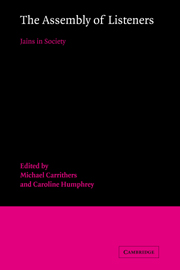Book contents
- Frontmatter
- Contents
- List of illustrations
- List of contributors
- Acknowledgements
- Map: South Asia
- Introduction
- 1 Jains as a community: a position paper
- 1 JAIN IDEALS AND JAIN IDENTITY
- 2 LOCAL JAIN COMMUNITIES
- 3 JAINS IN THE INDIAN WORLD
- 4 NEW JAIN INSTITUTIONS IN INDIA AND BEYOND
- Conclusion
- Glossary and pronunciation
- Select bibliography
- Index
1 - Jains as a community: a position paper
Published online by Cambridge University Press: 07 October 2011
- Frontmatter
- Contents
- List of illustrations
- List of contributors
- Acknowledgements
- Map: South Asia
- Introduction
- 1 Jains as a community: a position paper
- 1 JAIN IDEALS AND JAIN IDENTITY
- 2 LOCAL JAIN COMMUNITIES
- 3 JAINS IN THE INDIAN WORLD
- 4 NEW JAIN INSTITUTIONS IN INDIA AND BEYOND
- Conclusion
- Glossary and pronunciation
- Select bibliography
- Index
Summary
Although Jains have exerted an influence on Indian society and religion out of proportion to their relatively small numbers, they have received very little attention from scholars until the last few years. The purpose of this volume is to represent the current state of Jain studies, from both a sociological and an Indological point of view, and to lay the groundwork for further studies. The theme which we have chosen, that of Jains as a community, concerns what we feel to be the central problem in our understanding of Jainism. If this can be solved, then we will be better able not only to comprehend Jains, but also to contribute to the wider sociology of Indian religion and society.
It should first be remarked that the sense in which Jains are a community has not always seemed problematical. V. A. Sangave, in effect the pioneer of sociological studies of Jainism, did not so regard it. In his seminal monograph, Jaina Community: a Social Survey, he assumed from the outset that Jains do constitute a community in a significant sense, and he proceeded to lay out for us the anatomy of that community on an all-Indian scale. The value of this assumption has been plain to any scholar who has used Sangave's work.
- Type
- Chapter
- Information
- The Assembly of ListenersJains in Society, pp. 5 - 12Publisher: Cambridge University PressPrint publication year: 1991
- 3
- Cited by

